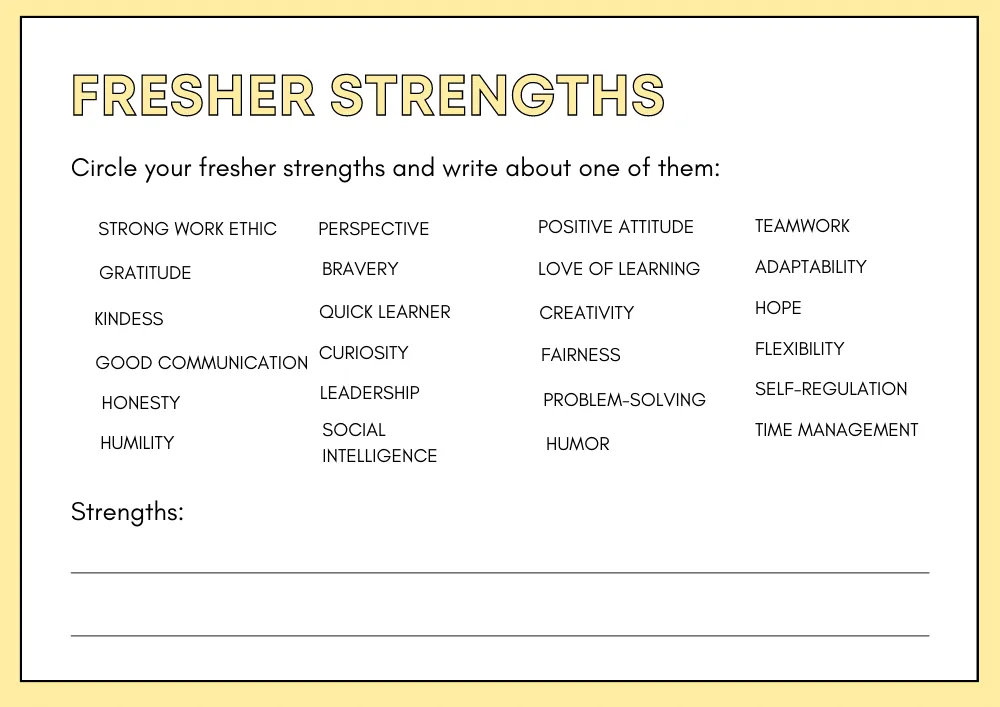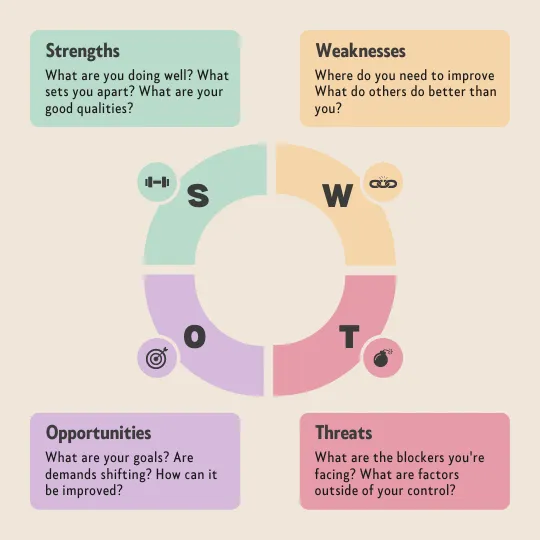Have you ever wondered what your strengths and weaknesses are and how to use them to your advantage? As a fresher, this question is crucial as you begin your journey into the profession and establish your career. Understanding your talents and shortcomings can help you make better decisions, perform better, and eventually achieve your goals.

In this article, we will discuss the significance of evaluating your strengths and shortcomings as a fresher and provide practical advice and techniques for strengthening your abilities and strengths. We will also discuss the importance of understanding your weaknesses and using them to your advantage.
Table of Contents
8 Fresher Strengths
First, let’s talk about your strengths and what makes you a valuable asset in this profession. As a fresher, your strengths may include the following:
- You bring a lot to the table as a fresher: Fresh ideas, new perspectives, and energy that can boost any workplace. Additionally, freshers are typically eager learners open to feedback and learning how to improve their skillset.
- Strong work ethic: You understand the importance of hard work and dedication and are willing to make the necessary effort to succeed. You put extra effort into your work and keep going until the job is complete.
- Curiosity: You are eager to learn about new topics and explore new ideas. You enjoy researching and learning about different approaches, which can be useful in problem-solving.
- Creativity: You can think outside the box and develop innovative solutions to problems. Your willingness to experiment with different methods can lead to better results.
- Communication: You understand how to communicate effectively and engage with others. You use storytelling, humor, and other tactics to ensure your message is understood.
- Adaptability: As a fresher, you may have limited experience in a given industry or function, but you are typically adaptable. You frequently adapt rapidly to new environments and job requirements, develop new skills, and adapt to changing conditions.
- Positive attitude: A positive attitude is a valuable asset in any profession. Freshers are often optimistic and enthusiastic, which can be contagious and help keep morale high in times of stress or difficulty.
- Quick learner: Freshers are often quick learners. You can quickly pick up new skills and adapt to changing tasks and environments, which is a valuable asset in the workplace.
What are your strengths? 7 Best Interview Question Answers
Top 15+ Strengths and Weaknesses of a Student
As an exercise, you can circle your strengths and mark which you can improve
6 Fresher Weaknesses
As a fresher, you may have some weaknesses that you should be aware of and work on improving. Some of the potential weaknesses include the following:
- Inadequate time management skills: As a new professional, you may need more time management skills to manage your workload. This can lead to missed deadlines, incomplete assignments, and unmet goals.
- Lack of confidence: You may need more confidence in your abilities and expertise. You may need help speaking up in meetings or presenting confidently to colleagues.
- Limited technical skills: You might need more experience in the industry or mastery of specific skills and tools. This can make it difficult to be successful with complex tasks or projects that require technical knowledge.
- Lack of experience: As a fresher, you may have little experience in the industry or job role. This can lead to difficulty understanding complex concepts or processes and make it difficult to learn and apply new skills quickly.
- Poor teamwork skills: Freshers may have limited experience working in teams, which can lead to challenges in collaborating with others. Building strong teamwork skills, such as active listening, effective communication, and conflict resolution, can help overcome this weakness.
- Difficulty handling stress: Starting a new job can be stressful, and freshers may struggle to manage their stress levels. Developing stress management techniques, such as exercise, meditation, or time management, can help address this weakness.
Remember, identifying your weaknesses is the first step to improving them. You can focus on building new skills and addressing gaps in your knowledge or experience by acknowledging areas where you may need additional support. Additionally, seeking feedback from colleagues, mentors, or supervisors can help you gain insights into areas where you can improve and develop new strengths.
How to develop your strengths and address your weaknesses?
Developing your strengths and addressing your weaknesses as a fresher can be done in several ways. Here are some tips for improving both:
- Identify your strengths and weaknesses: The first step in developing and improving your skills is becoming aware of your strengths and weaknesses. Spend some time reflecting on what you’re good at, such as writing or public speaking, and areas that need improvement, such as problem-solving or decision-making.
- Seek feedback: Getting feedback from trusted colleagues, mentors, or supervisors can provide valuable insights into where you can improve and what steps you should take.
- Set goals: Once you know your strengths and weaknesses, set specific goals for developing them. For example, if you want to improve your public speaking skills, set a goal of giving three presentations in the next month.
- Seek out opportunities: Take advantage of available resources and opportunities to develop your strengths and address your weaknesses. Consider apprenticeships, workshops, or online courses to build skills in specific areas.
- Practice: Practicing is essential for mastering new skills and improving existing ones. You can practice independently or with colleagues to hone your abilities and become more confident in what you do.
- Find a support system: It’s important to have a support system of people willing to encourage and help you reach your goals. This could include colleagues, mentors, or supervisors who can provide feedback and advice.
By making an effort to identify and address your weaknesses, you can take steps toward becoming the professional you want to be. Practice, patience, and determination can turn your weaknesses into strengths. Good luck!
List of strengths and weaknesses for a fresher resume
Sure, here are some examples of strengths and weaknesses that a fresher might include on their resume:
10 Strengths:
- Strong work ethic
- Good communication skills
- Adaptability
- Positive attitude
- Quick learner
- Ability to work well in a team
- Attention to detail
- Problem-solving skills
- Time management skills
- Flexibility
10 Weaknesses:
- Lack of professional experience
- Limited technical skills
- Inadequate time management skills
- Poor teamwork skills
- Difficulty handling stress
- Need for additional training or development in a specific area
- Limited industry knowledge
- Shyness or difficulty speaking up in meetings or presentations
- Overthinking or second-guessing decisions
- Struggle with public speaking or presenting to large groups
Remember, when including weaknesses on a resume, always use positive language to describe them. For instance, rather than saying ‘inexperienced’ or ‘lack of skills’, you could say ‘seeking additional training’ or ‘desiring more experience in a specific area’. This will help employers focus on your strengths and abilities instead of focusing solely on areas that need improvement.
Conclusion
In conclusion, it is important to identify strengths and weaknesses as a fresher. Taking the time to reflect on your skills, knowledge, and experience can help you identify areas for improvement and develop new strengths. Additionally, seeking feedback from colleagues, mentors, or supervisors can provide valuable insights into where you can improve and what steps you should take. With practice, patience, and determination, you can turn your weaknesses into strengths and become the professional you want to be. Good luck with the future!

